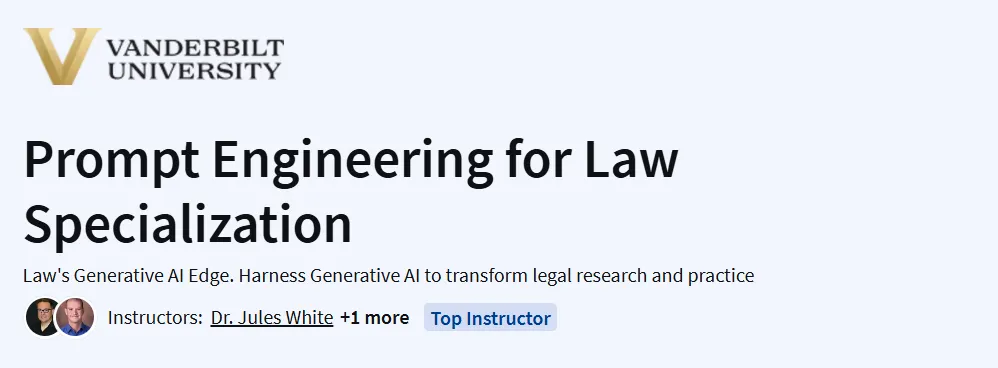What you will learn in Prompt Engineering for Law Specialization Course
- Foundations of Generative AI in Law: Understand the principles of generative AI and its applications in legal contexts.
- Prompt Engineering Techniques: Learn how to craft effective prompts to interact with large language models like ChatGPT for legal tasks.
- Legal Applications of AI: Explore how AI can assist in legal research, document drafting, and due diligence processes.
- Ethical and Privacy Considerations: Gain insights into the ethical implications and privacy concerns when using AI in legal practice.
- Scenario Testing: Develop skills to test and refine AI-generated outputs to ensure accuracy and relevance in legal applications.
Program Overview
Introduction to Generative AI and Law
⏳ 1 month (10 hours per week)
Overview of how AI is transforming the legal industry and the basics of how generative AI models work.
Effective Prompting Techniques for Legal Tasks
⏳ 1 month (10 hours per week)
Deep dive into prompt engineering methods for legal contexts, including case law search, contract analysis, and document drafting.
Using AI Tools for Legal Research and Writing
⏳ 1 month (10 hours per week)
Practical skills for using AI tools like ChatGPT and other platforms for creating legal content, drafting, and research.
Ethics and Legal Implications of AI
⏳ 1 month (10 hours per week)
Explore the ethical challenges and legal considerations when incorporating AI into legal practices, with a focus on confidentiality and fairness.
Designing Legal Workflows with AI
⏳ 1 month (10 hours per week)
Apply the learned techniques to design AI-assisted legal workflows, focusing on automating routine tasks and improving efficiency.
Get certificate
Job Outlook
- Proficiency in Prompt Engineering for Law is valuable for roles such as:
- Legal Technologist
- Legal Research Analyst
- Contract Manager
- Compliance Officer
- Skills acquired in this specialization are applicable across various legal settings, including law firms, corporate legal departments, and government agencies.
- Completing this specialization can enhance your qualifications for positions that require expertise in integrating AI technologies into legal practices.
Specification: Prompt Engineering for Law Specialization
|
FAQs
- No programming background is required; the focus is on prompt design.
- A basic understanding of legal concepts is helpful but not mandatory.
- The course introduces legal contexts step by step with examples.
- Designed for law students, professionals, and anyone interested in legal AI tools.
- Helps generate case summaries, legal memos, and document drafts quickly.
- Improves accuracy in finding relevant precedents and regulations.
- Supports contract analysis, compliance checks, and due diligence tasks.
- Enhances productivity by automating repetitive legal writing tasks.
- Discusses confidentiality, data protection, and client privacy in AI-assisted law.
- Highlights risks of bias, misinformation, and over-reliance on AI tools.
- Provides strategies for verifying AI outputs against legal standards.
- Encourages responsible, ethical adoption of prompt engineering in practice.
- Strengthens skills in legal writing, analysis, and research efficiency.
- Gives an edge in modern law firms, legal tech roles, and academic work.
- Enhances competitiveness by combining legal knowledge with AI literacy.
- Serves as a foundation for further specialization in legal technology.
- The course demonstrates AI platforms accessible to most learners.
- Many tools offer free or trial versions sufficient for practice.
- Emphasis is on designing prompts, not advanced programming or custom AI.
- Paid versions are optional for learners who want extended features.





